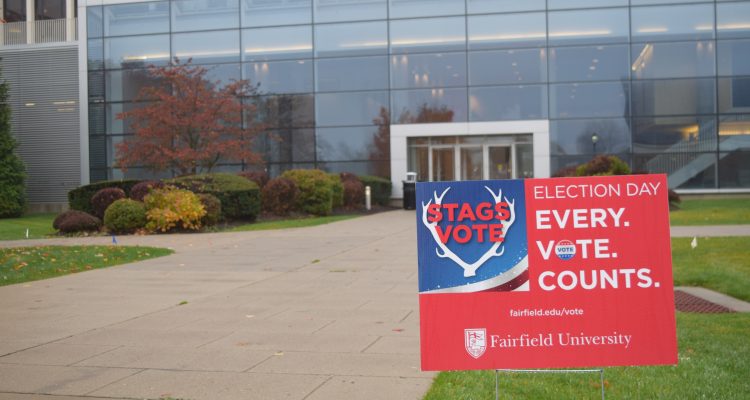Voters across the country, the state of Connecticut and the town of Fairfield went to the polls to vote in the midterm election on Nov. 6, 2018. The control of the House of Representatives and the U.S. Senate was up in the air, and, statewide, Connecticut voters were choosing a new governor and settling decisions on the control of their state house and state senate.
On election day, Fairfield University visiting professor of politics Dr. Aaron Weinstein, Ph.D., mentioned that poll workers said they had not seen turnouts this high in more than 30 years.
Nationally, reports state that the Democrats have taken control of the House of Representatives. Connecticut’s Fourth Congressional District, which Fairfield is located in, continues to be represented by Congressman Jim Himes, the Democrat who has remained in office since 2008.
Weinstein commented on the impact of Democrats taking the house through an email to the Mirror before the election.
“Let’s start with the House. If Democrats were to take the House, they’d have significant legislative power (at least in terms of producing legislation that the Democratic caucus would prefer),” Weinstein explained. “Most immediately, they have the power to select the leadership of the House (Speaker, Majority Leader, committee chairs/subcommittee). Perhaps most importantly they get control of the House Rules Committee, which determines how legislation is debated/who can add amendments/how many can be added/etc. It’s an immense power, because if you can control how legislation gets to the floor you can heavily constrain what is eventually passed.”
Additionally, Weinstein mentioned that, in gaining the house, Democrats have gained subpoena power. This will allow them to request information from the Trump administration.
Republicans retained control of the Senate, where one third of the seats were up for vote. In Connecticut, incumbent Democratic Senator Chris Murphy won reelection. Murphy was first elected to the U.S. Senate in 2012, and before then was the representative for Connecticut’s Fifth Congressional District.
Weinstein explained the implications of a now-divided government. When parties control only one house of government, as the Democrats now do, they can create legislation that they believe will play well to their electorate.
“I’d say [the Democrats] push legislation they know their constituencies like, but that Trump wouldn’t sign,” described Weinstein. “For instance gun control, campaign finance reform, environmental legislation, etc.”
First-year Danielle Sondgeroth was a first-time voter this year. “Definitely gun control is very important for me because I live in an area where there are a lot of shootings and that’s a very big issue, it’s a really big problem where I live,” said Sondgeroth. “So I think that we need to vote so that we have better gun control.”
On campus, some students participated in Election Day Registration in the Lower Level of the Barone Campus Center. Fairfield was also an EDR location in 2016.
“It’s important people vote, and there’s plenty of options, so I think a lot of people think it seems like a lot of effort or they don’t mail it in on time,” said Sean Farley ‘19. “But with the school it provides plenty of options where there’s really no excuse. I didn’t do anything to prepare for this and it took me fifteen minutes total, so everybody should do this.”
Junior Sarah Popolizio echoed Farley’s sentiments. “It is definitely important for people to recognize, especially at our age, that we have a right, and we should use that right,” said Popolizio, “Especially if we feel dissatisfied with the way that our country and our state and our local area is going.”
Voters across the country, including in Connecticut, were also voting on state and local candidates. At print time, the race for Connecticut governor between Republican Bob Stefanowski ‘84 and Democrat Ned Lamont remained too close to call. In the state house and senate, several races were too close to call, so at print time, there were not exact numbers for the balance of the state government in Hartford. However, the Democratic party was poised to pick up seats in both houses of the legislature, including a surprise victory by new State Senator Will Haskell, representing Fairfield’s neighboring senate district. Before the 2018 election, the state senate was tied at 18-18.
The state senate race between Democrat Michelle Lapine McCabe and incumbent Republican Tony Hwang also remained too close to call. Campus residents living anywhere except John C. Dolan Hall have State Representative Cristin McCarthy-Vahey, the incumbent Democratic representative. Dolan Hall residents will continue to be represented by Republican State Representative Brenda Kupchik.
Both of the ballot measures in Connecticut passed. The first ballot question protects dedicated transportation funds from being spent elsewhere. The second ballot question requires a public hearing before any public land can be transferred into private control.
At print time, the complete voter turnout data for the town of Fairfield was not available from the registrar of voters. 79.09% of the ballots had been counted for a total of 27,588 ballots. Extrapolating from there, The Mirror estimates that there were 34,881 ballots cast in the town of Fairfield. While an unknown-at-press-time number of voters registered on election day at the BCC, before EDR, 37,293 voters were registered in Fairfield. In 2014, 20,998 people voted in Fairfield, and in 2016, 32,115 people voted in Fairfield; more people voted in Fairfield on Nov. 6 than did in either of the past two elections.
UPDATE, Nov. 7 at 11:47 a.m.: Stefanowski conceded to Lamont on the morning of Wednesday, Nov. 7. Hwang is also projected to have won the 28th Senate district.


Leave a Reply